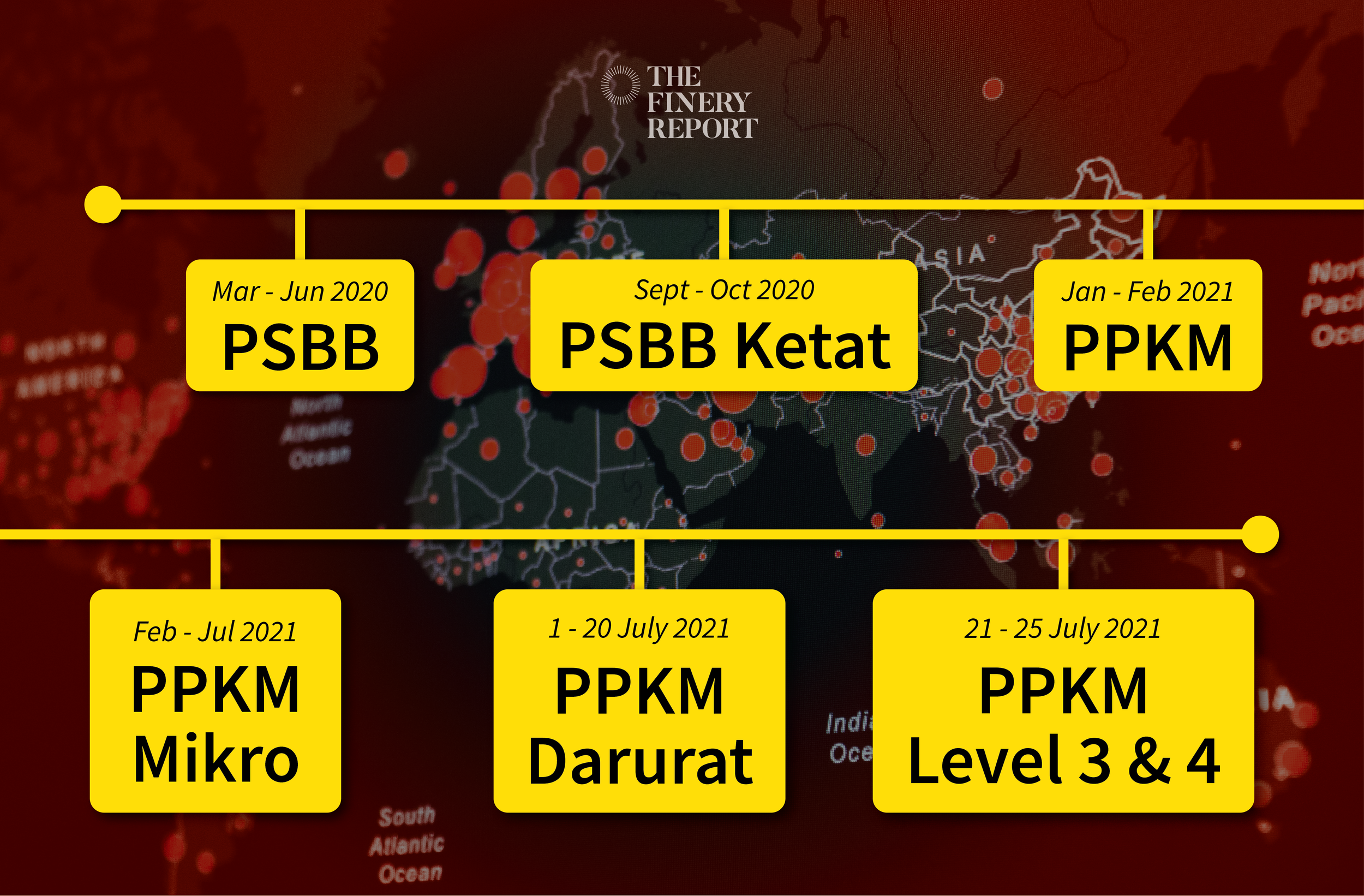How Indonesian govt handles pandemic: COVID-19 related policies summed up
Read in Indonesian
About two weeks ago, Indonesia became the new epicentre of COVID-19, surpassing Brazil and India with more than 40,000 confirmed cases per day. To curb the pandemic, the Indonesian government has taken several measures and implemented various policies.
Indonesia recorded its first two COVID-19 cases on 2 March 2020. Since then, the transmission rate continued to increase to the point where it became uncontrollable. To get a grip on the whole crisis situation, the Indonesian government established specific actions, starting by imposing travel restrictions to and from mainland China, South Korea, Iran and Italy - countries with surging COVID-19 cases at that time.
On 13 March 2020, the government announced Presidential Decree No.7/2020 that stipulates the formation of the COVID-19 Response Acceleration Task Force that will act as the coordinator that oversees the government's efforts in accelerating COVID-19 mitigation efforts. A few days later, President Joko Widodo introduced the practice of social distancing to the public and announced a plan to impose a lockdown.
At the same time, Finance Minister Sri Mulyani Indrawati announced a Rp1 trillion budget for the healthcare sector and pandemic prevention efforts which was sourced from the infrastructure budget. Meanwhile, Education, Culture, Research and Technology Minister Nadiem Makarim announced that the ministry is ready to facilitate online learning and provide free platforms to support it. Not long after, the government released official COVID-19 health protocols for the public.
In late March 2020, the president passed Government Regulation No.21/2020 into law. It regulates large-scale social restrictions (PSBB) which allow regional governments to restrict the movement of people and goods in and out of their respective territory. The law also limits public gatherings, physical worship activities, school and work. On 14 April 2020, President Widodo signed Presidential Decree No.11/2020 that declares the COVID-19 pandemic as a national disaster. Indonesia also banned Idul Fitri exodus to stop COVID-19 transmission in accordance with Transportation Ministerial Regulation No.25/2020.
In July 2020, based on Presidential Regulation No.82/2020, the COVID-19 Response Acceleration Task Force was dissolved and its duties were handed over to the COVID-19 handling task unit in the National COVID-19 Handling and Economic Recovery Committee. The committee implements all formulas to minimise COVID-19 outbreak and at the same time strives to recover the national economy.
In August 2020, the president issued Presidential Regulation No.6/2020. Since then, health protocols are no longer considered a suggestion or recommendation, but a requirement that should be enforced. From September to October 2020, the COVID-19 Task Force tried to minimise the spread of COVID-19 at the grassroot level by educating the public about the 3M practices to prevent COVID-19 transmission in the family cluster.
In September 2020, to support efforts to handle the pandemic and the National Economic Recovery (PEN) programme, the government allocated a budget of Rp695.2 trillion, with Rp 87.55 trillion allocated for the health sector. The government also prepared Rp372 trillion to continue the economic recovery programme in 2021. At the end of 2020, the government began to focus more on accelerating the procurement of COVID-19 vaccine, as stipulated in Presidential Regulation No.99/2020.
Fast forward to 2021, in January, the government through Home Affairs Minister Tito Karnavian issued Home Affairs Ministerial Instruction No.1/2021 that regulates the implementation of another lockdown in Java and Bali . However, unlike the previous lockdown, this time the government introduced a new term, namely PPKM or Community Activities Restrictions. In February, President Widodo reintroduced a new concept of ‘micro scale’ lockdown, as the large scale lockdown was deemed ineffective. The president believed that micro scale PPKM will be more effective as Indonesia has government apparatuses up to the smallest units at the neighbourhood level.
In the first half of 2021, the government’s COVID-19-related policies were more focused on the mass vaccination programme, assessing the effectiveness of lockdown and speeding up social assistance distribution to highly-affected groups. Unfortunately, at the same time, the number of COVID-19 cases continue to increase uncontrollably after Idul Fitri 2021 despite the implementation of a stricter exodus ban compared to last year.
In terms of the vaccination programme, Indonesia by late July had secured at least 173 million doses of COVID-19 vaccine: 147.7 million from Sinovac, 14.8 million from AstraZeneca, 6 million from Sinopharm and 4.5 million from Moderna. Indonesia also received a caution from the World Health Organisation in regard with the Gotong Royong vaccination scheme, which is a self-paid COVID-19 vaccine programme organised by state-owned pharmaceutical company Kimia Farma, as it poses ethical issues and hampers efforts to guarantee equal access to vaccines.
The public also criticised the program as it is seen as an attempt to commercialise vaccination and profit from the pandemic. The programme was cancelled days after the announcement.
With the new and deadlier Delta variant and despite the implementation of above mentioned policies, Indonesia on 15 July reached its coronavirus peak with 56,757 daily cases. At the time this article is written, Java and Bali are undergoing a micro-scale lockdown that will be relaxed soon, as stated by the president on 25 July.
Currently, the country has recorded 3,239,936 cases and 86,835 deaths, three times higher than the global average death rate. With that being said, the Indonesian government keeps getting criticised for its poor performance in handling the pandemic and people started to question the effectiveness of the policies.
Update: PPKM has been extended until 9 August

